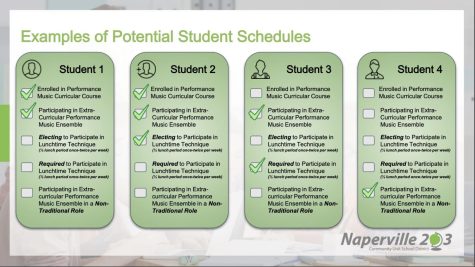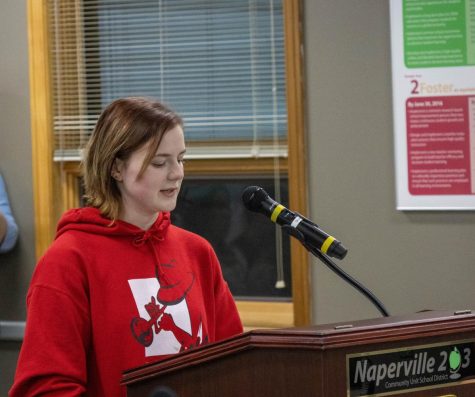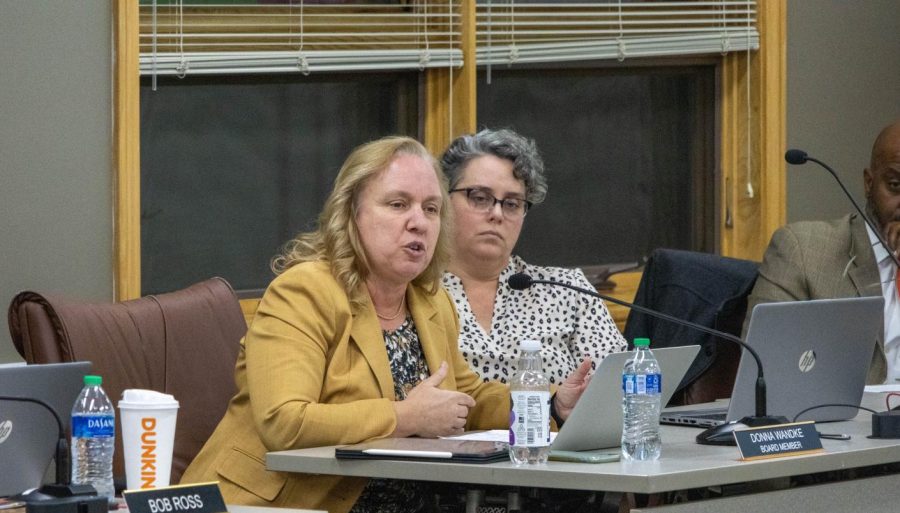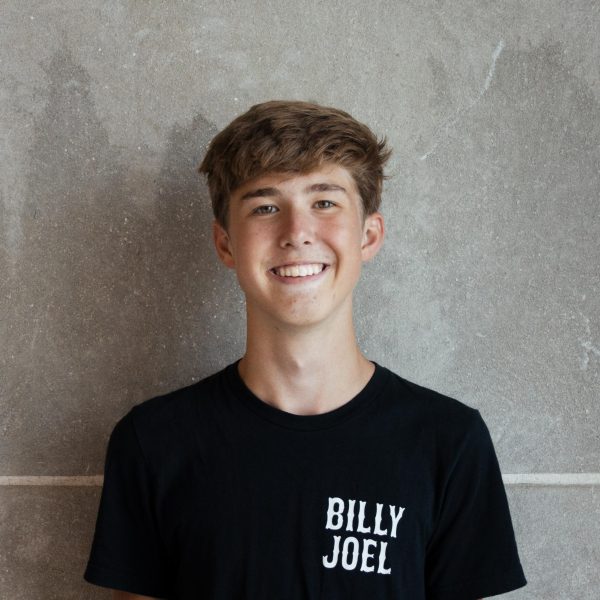D203 Board narrowly approves sweeping changes to high school music program
Board member Donna Wandke, who voted to reject the proposal that would add co-curricular music requirements, speaks in dissent at the Jan. 23 board meeting.
January 30, 2023
District 203’s Board of Education approved changes to the music programs at both high schools, requiring all students who want to participate in an extracurricular music activity to enroll in a curricular music course or a newly added lunchtime technique course.
The changes were approved on Jan. 23 for the 2023-24 school year by a 4-3 vote after the Board of Education discussed the proposal for several hours across three meetings.
Technique courses will meet once to twice a week for 25 minutes of a student’s lunch period.
“Part of our process on technique is working with a student individually to see where they’re at, then moving them in and out of different supports based on what they need,” said Nicholas Janssen, Naperville North Fine Arts department chair.
The course will be divided by both skill level and instrument, allowing students to receive targeted feedback in a way that was previously difficult, Janssen said.
“In order for us to individually provide feedback or instruction to a student, we have to do so by working with them either before school, at lunch or after school,” Janssen said. “It’s really difficult to make that happen. The technique instruction provides us a formal outlet to be able to access kids and give them feedback.”
Participating in a technique or curricular music class will now be required if students want to participate in an extracurricular music group.
This is in part meant to improve the experiences of all extracurricular music students, and to diminish time dedicated to teaching technique in extracurriculars.
“In order to prepare our volunteer marching band, we need to start very early to prepare for what we will see come August,” Central band director Brandon Estes said in a presentation at Jan. 9 board meeting. “That comes from the technique of music and the technique of visual. Being given the opportunity to approach some of those things during the school day takes away some of those summer hours, because it’s being reinforced on a daily basis.”
Students engaging in “non-traditional roles” in extracurricular music groups — such as piano and guitar players or color guard performers — will not be required to take a music class during the year. Exceptions may also be made for students who cannot fulfill the requirements due to other lunchtime commitments.
“These would be certain unique scenarios where a student could not meet the requirements and we would find a way to work with them,” Janssen said at the Jan. 9 board meeting. “We’ll always work with every individual student to try and make it work for them.”
The new requirements began to take shape after a team of district administrators and high school music directors met early in 2022 for a review of the program.

“It was important for us to begin this review to ensure that we were not in the same place every year having the same conversations about decline in our program,” said Dr. Chala Holland, Assistant Superintendent for Administrative Services for high schools, at the Jan. 9 board meeting. “To proactively take steps to make sure that we are meeting our vision and that we’re putting structures in place for it to grow.”
Janssen, a member of the team, said the initial goal was to resolve issues in teaching state music standards to students in extracurricular but not curricular music groups.
“Our motivation was ‘we’re currently teaching ensemble standards, but not getting to the individual standards,’” Janssen said. “‘How can we access [extracurricular] kids individually in a better way to be able to deliver those standards?’”
Music educators will be paid to teach the technique classes, a change that may decrease staff turnover, according to the team. Teachers will also spend less time helping students before or after school as a result of the changes.
“Selling a job that is ‘you are kind of part time but you have all of these extracurricular responsibilities’ is really difficult to find a high quality person for that role,” Janssen said at the Jan. 9 meeting. “[District 203 has] a lot of turnover as a result of that model, because we don’t look like we do in other districts [with co-curricular requirements].”
Holland also said the changes will provide students who can’t afford private lessons with a way to receive help in the form of the technique classes.
The changes were met with opposition from both the community and some members of the school board.
Four students spoke against the changes at the Jan. 9 meeting, and six more parents and students spoke against them at the Jan. 23 meeting, primarily citing concerns over the ability of students to comply with the co-curricular requirement.

“Some students undoubtedly want their musical excellence accounted for on their high school transcripts, but we should not strip the joy of music from those who do not,” Central junior Bianca Cima said in a public comment at the Jan. 9 board meeting.
Board members Charles Cush, Donna Wandke and Joseph Kozminski voted against the proposal.
“I feel like we’re taking choices away from our students instead of allowing them to explore,” Wandke said at the Jan. 23 meeting. “ I want them to have the opportunity, I want to pay our staff to give them the opportunity. I just don’t want to take choices away from students. That just seems so wrong to me.”
Wandke and Cush both called for finding a different solution.
“The problem we’re trying to solve is we’re losing potential teachers,” Cush said at the Jan. 23 board meeting. “Let’s find a way to solve that problem without pushing the burden to the parents and to the students, and forcing them to make a choice between something they’re passionate about, and making it a requirement.”
Wandke also raised concerns about the reliability of any data that could be used to support the changes due to outside factors such as the COVID-19 pandemic.
“I agree, I don’t think we’re gonna get good data,” board member Tony Casey said at the Jan. 9 meeting. “But here’s the thing, when you don’t have good data you don’t just go with the system you happen to [already have]. If you don’t have good data, you rely on experts, and you rely on process. And I think we had experts who went through a very thorough process and tell us this is the best way to teach music, and to me, that’s what I need to know.”
Casey and fellow board members Kristen Fitzgerald, Amanda McMillen and Kristine Gericke voted to approve the changes.
“Change is scary,” Central choir director Kelly Mielcarz said. “That fear of the unknown causes a lot of anxiety sometimes, but I think and I’m hoping that as we work through it, we will find benefits on the other side.”









